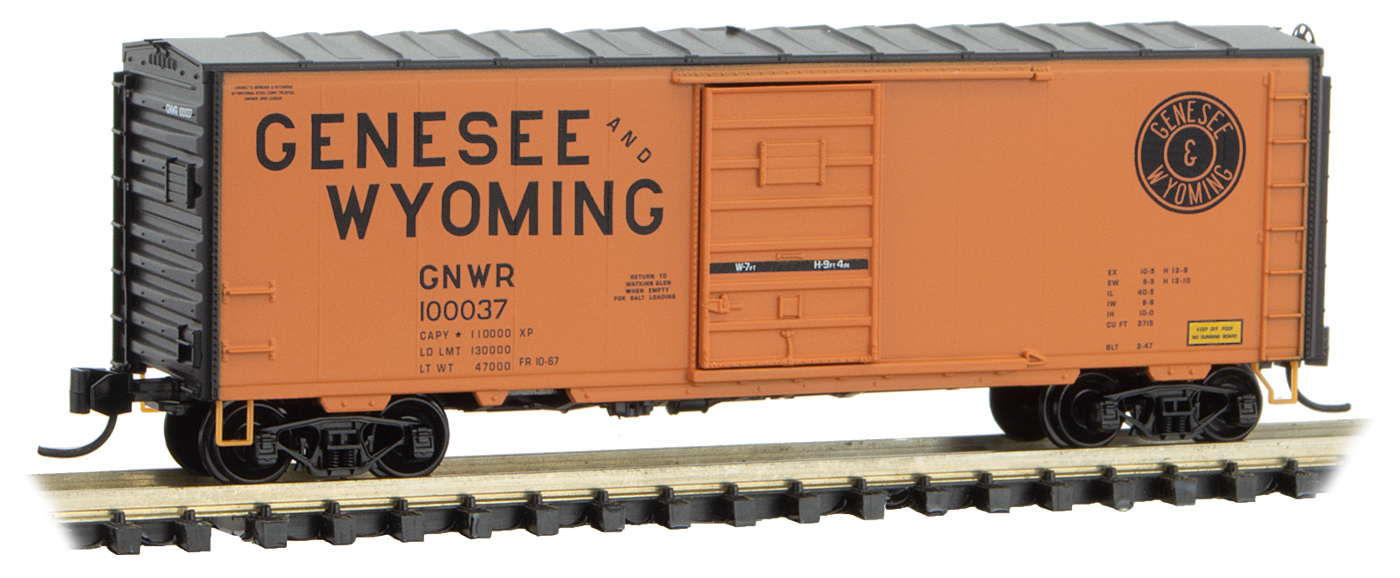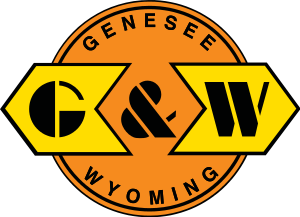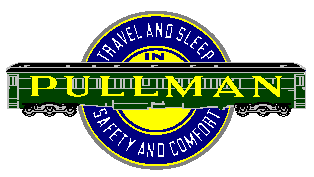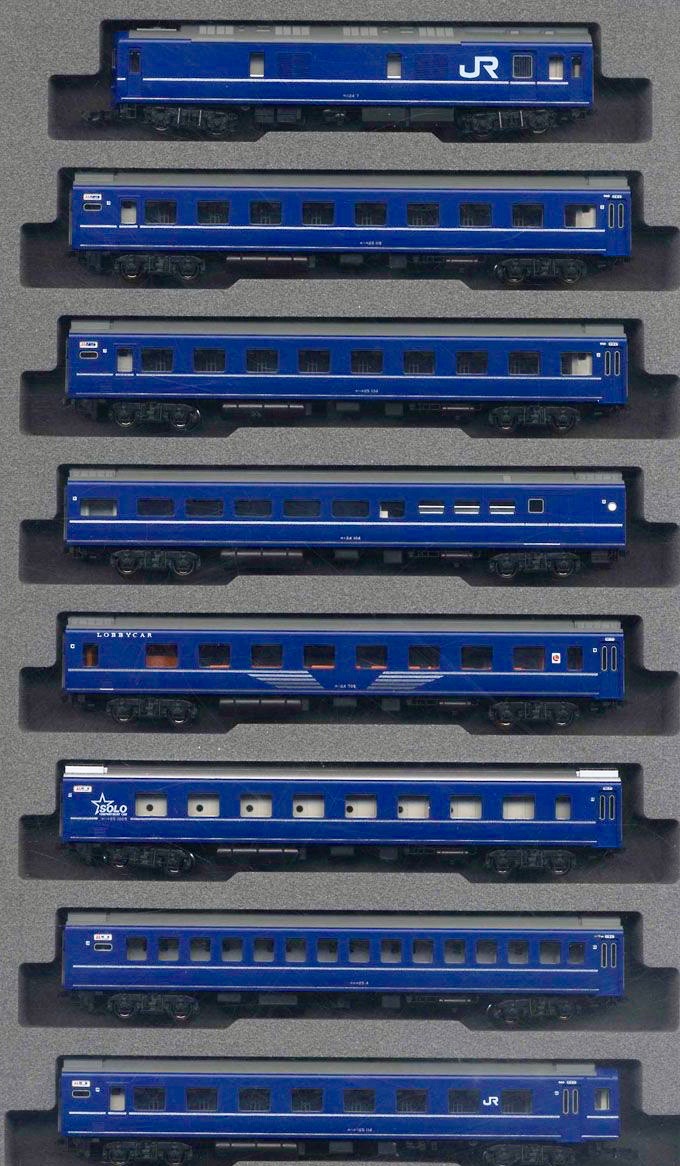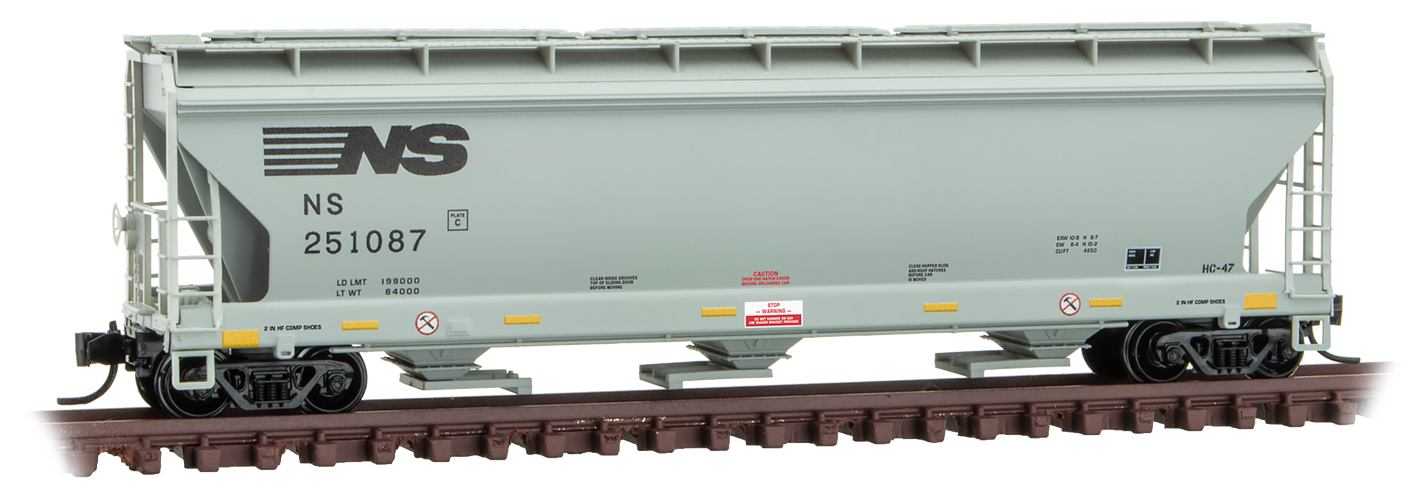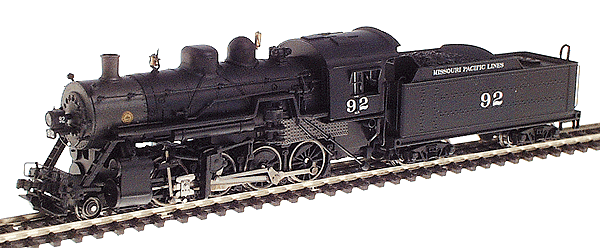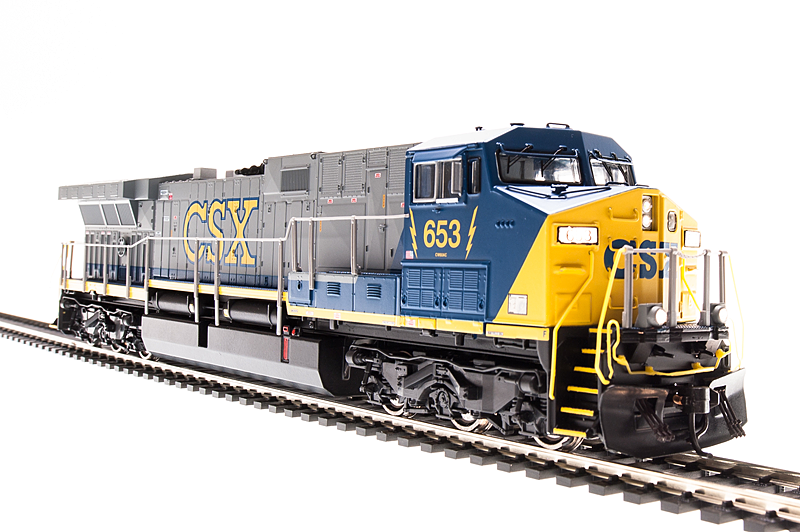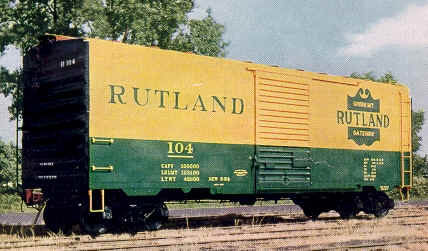Specific Item Information: Built in 1947, this 40’ box car was placarded to be used for salt loading only, and to be returned to Watkins Glen, NY when empty. Genesee & Wyoming was founded more than 100 years ago as a short line in western New York. Today, Genesee & Wyoming Inc. is one of the largest providers of rail-freight transportation, owning more than 120 regional railroads across the world.
Series Information: Special Offering / Regional Railroads
Model Information: Micro-trains introduced this model in January of 2001. This is one of the several variations of the Micro-Trains PS-1 boxcar. It is similar to the 20000 series boxcar with one major difference. There is no roofwalk. The example we looked at also uses the wide-rib doors, but this varies from model to model. Many examples use the narrow-rib doors common on the 20000 series boxcar. This is not a very common model as very few 40' boxcars were in use at the time that roofwalks were banned. The Per Diem era of the 1970s and later saw the 50' boxcar replace the 40' boxcar as the 'go-to' general purpose railcar and hence we now associate 40' boxcars with roofwalks and 50' boxcars as being 'bald'.
Prototype History: The 40' Boxcar is widely known as one of the most popular freight cars used by railroads as they transitioned from steam to diesel. In particular the Pullman Standard or PS-1 design was one of the most popular and was widely used by North American railroads. These boxcars were built beginning in 1947 and share the same basic design, with certain elements such as door size, door style or roof type varying among the different railroads and production years. When production of these cars ceased in 1963, over 100,000 had been produced.
So just what is a PS-1? Well the simple answer is it is any boxcar built by Pullman Standard from 1947 on. The design changed over the years – sometimes subtly, sometimes for customer request, and sometimes in a larger way. In general, most PS-1’s built from 1947 to 1961 share the same dimensions and basic construction techniques. These cars all had a length of 40′, a height of 10’5″ or 10’6″, welded sides and ends and roof of Pullman’s own design. The greatest variation was in the size and style of doors used. Pullman Standard also offered 50′ and later 60′ boxcars – also with the PS-1 designation.
So just what is a PS-1? Well the simple answer is it is any boxcar built by Pullman Standard from 1947 on. The design changed over the years – sometimes subtly, sometimes for customer request, and sometimes in a larger way. In general, most PS-1’s built from 1947 to 1961 share the same dimensions and basic construction techniques. These cars all had a length of 40′, a height of 10’5″ or 10’6″, welded sides and ends and roof of Pullman’s own design. The greatest variation was in the size and style of doors used. Pullman Standard also offered 50′ and later 60′ boxcars – also with the PS-1 designation.
Road Name History: Known today as the largest of the shortline holding companies, Genesee & Wyoming began as a shortline by that name in 1899 with a 15 mile line between Retsof and Caledonia, New York, just south of Rochester. In 1982, they extended southward to Greigsville by buying a former Lackawanna line from Conrail. In 1985, another purchase extended their reach north to Rochester and southwest to Silver Springs. This brought the mileage up to about 90. The Wyoming in the name is a reference to the Wyoming Valley.
In 1977, the railroad set up Genesee & Wyoming Inc. as a parent company. In 1985, they began to buy other shortlines and launch new ones as various Class One routes came up for sale or lease. Each of these lines operates under their own names but share the orange, yellow and black GNWR paint scheme, variations of which have been used by GNWR for decades. The logos of these related lines also use the GNWR style but with different wording and the occasional personalized element.
As of this writing, the Genesee & Wyoming family includes 121 shortline and regional railroads spread across North America, Europe and Australia. As of 2019, G&W became a subsidiary of Brookfield Infrastructure Partners. G&W has also bought other shortline groups, notably Rail Link in 1996, Summit View (the Ohio Central System) in 2008, Rail Management in 2005,.CAGY Industries in 2008, and largest of all RailAmerica in 2012.
Ironically, the Genesee & Wyoming Railroad was merged into the Rochester & Southern in 2003. The GNWR exists as a paper railroad but the logos on the diesels patrolling the old GNWR now say Rochester & Southern or the neighboring Buffalo & Pittsburgh.
In 1977, the railroad set up Genesee & Wyoming Inc. as a parent company. In 1985, they began to buy other shortlines and launch new ones as various Class One routes came up for sale or lease. Each of these lines operates under their own names but share the orange, yellow and black GNWR paint scheme, variations of which have been used by GNWR for decades. The logos of these related lines also use the GNWR style but with different wording and the occasional personalized element.
As of this writing, the Genesee & Wyoming family includes 121 shortline and regional railroads spread across North America, Europe and Australia. As of 2019, G&W became a subsidiary of Brookfield Infrastructure Partners. G&W has also bought other shortline groups, notably Rail Link in 1996, Summit View (the Ohio Central System) in 2008, Rail Management in 2005,.CAGY Industries in 2008, and largest of all RailAmerica in 2012.
Ironically, the Genesee & Wyoming Railroad was merged into the Rochester & Southern in 2003. The GNWR exists as a paper railroad but the logos on the diesels patrolling the old GNWR now say Rochester & Southern or the neighboring Buffalo & Pittsburgh.
Brand/Importer Information: Micro-Trains is the brand name used by both Kadee Quality Products and Micro-Trains Line. For a history of the relationship between the brand and the two companies, please consult our Micro-Trains Collector's Guide.
Manufacturer Information:  Micro-Trains Line split off from Kadee Quality Products in 1990. Kadee Quality Products originally got involved in N-Scale by producing a scaled-down version of their successful HO Magne-Matic knuckle coupler system. This coupler was superior to the ubiquitous 'Rapido' style coupler due to two primary factors: superior realistic appearance and the ability to automatically uncouple when stopped over a magnet embedded in a section of track. The success of these couplers in N-Scale quickly translated to the production of trucks, wheels and in 1972 a release of ready-to-run box cars.
Micro-Trains Line split off from Kadee Quality Products in 1990. Kadee Quality Products originally got involved in N-Scale by producing a scaled-down version of their successful HO Magne-Matic knuckle coupler system. This coupler was superior to the ubiquitous 'Rapido' style coupler due to two primary factors: superior realistic appearance and the ability to automatically uncouple when stopped over a magnet embedded in a section of track. The success of these couplers in N-Scale quickly translated to the production of trucks, wheels and in 1972 a release of ready-to-run box cars.
Micro-Trains Line Co. split off from Kadee in 1990 to form a completely independent company. For this reason, products from this company can appear with labels from both enterprises. Due to the nature of production idiosyncrasies and various random factors, the rolling stock from Micro-Trains can have all sorts of interesting variations in both their packaging as well as the products themselves. When acquiring an MTL product it is very important to understand these important production variations that can greatly enhance (or decrease) the value of your purchase.
Please consult our Micro-Trains Collector's Guide

Micro-Trains Line Co. split off from Kadee in 1990 to form a completely independent company. For this reason, products from this company can appear with labels from both enterprises. Due to the nature of production idiosyncrasies and various random factors, the rolling stock from Micro-Trains can have all sorts of interesting variations in both their packaging as well as the products themselves. When acquiring an MTL product it is very important to understand these important production variations that can greatly enhance (or decrease) the value of your purchase.
Please consult our Micro-Trains Collector's Guide
Item created by: CMK on 2019-11-30 09:56:34. Last edited by gdm on 2020-06-09 07:31:13
If you see errors or missing data in this entry, please feel free to log in and edit it. Anyone with a Gmail account can log in instantly.
If you see errors or missing data in this entry, please feel free to log in and edit it. Anyone with a Gmail account can log in instantly.


